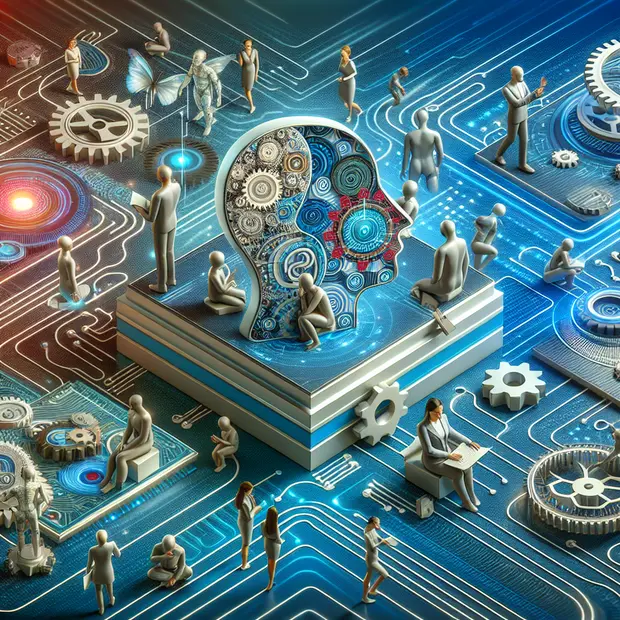Understanding Algorithmic Bias and Its Importance in Programming
Explore the concept of Algorithmic Bias in AI, its importance in programming, ethical considerations and its role in shaping the future of AI.

As we navigate the evolving landscapes of artificial intelligence (AI) and machine learning (ML), it's vital to understand the concept of Algorithmic Bias and its significance in programming. This term often surfaces in discussions around AI ethics and its future.
Decoding Algorithmic Bias: An In-depth Look
Algorithmic Bias is a term that has been rapidly gaining traction in the realm of computer science and beyond. In essence, it pertains to the systematic and repeatable anomalies present in computer systems that can inadvertently lead to decisions that are prejudiced or unfair. This often leads to the privileging of one group of users over others, a scenario that raises serious questions about the impartiality of automated systems.
Delving a bit deeper, algorithmic bias is often an unintended consequence of the use of biased data for training artificial intelligence (AI) models. These models, a crucial component of the larger computers' systems, are essentially molded by the data they are fed. Consequently, any subjective leanings or prejudices ingrained in that data are reflected in the outputs of these AI systems. This can result in outcomes that are far from equitable, highlighting the criticality of this issue.
While some might argue that machine learning algorithms are unbiased due to their mathematical nature, it's important to understand that the data from which these algorithms learn can inadvertently carry human biases. For instance, if an AI system is trained predominantly on data representing a particular group, the system may fail to accurately predict or analyze data from a different group. This can lead to outcomes that, while not intentionally prejudiced, are unfairly skewed towards the group represented in the training data.
Furthermore, the sources from which the data is collected may also harbor inherent biases, which can subsequently seep into the AI model. For example, if an AI model used for hiring is trained on data from a company that has historically favored a certain type of candidate, the AI system may inadvertently perpetuate this bias. This underlines the importance of using diverse, representative, and balanced datasets for training AI models to minimize the risk of algorithmic bias.
In summary, whilst algorithmic bias is a complex and multi-faceted issue, it primarily stems from biased data used for AI model training. The consequences of these biases can be far-reaching, affecting individuals and groups in ways that may privilege one over the other. It is therefore vital that we continue to investigate and understand this issue, to ensure the development of fair and equitable AI systems.
Delving Deeper into the Significance
Algorithmic bias has emerged as a critical concern for developers and programmers worldwide. This bias, intentionally or not, influences the results generated by Artificial Intelligence (AI) systems. It can alter the accuracy, skew the fairness, and compromise the trustworthiness of the outcomes. This impact is subtly pervasive, altering the scope of how AI affects our lives and society as a whole.
AI technology, with its vast potential and transformative capabilities, is increasingly being incorporated into a wide array of sensitive sectors. These include but are not limited to healthcare, finance, law enforcement, and even education. As such, these sectors which fundamentally impact human life and society, come under the influence of AI's capabilities and, by extension, its potential biases.
In the healthcare landscape, AI systems are utilized for diagnosis, patient care, and even organizing complex data sets. However, the presence of algorithmic bias could potentially lead to misdiagnoses or even inappropriate treatment plans. As such, ensuring these systems are as unbiased as possible is paramount in maintaining the integrity of patient care.
Similarly, the finance sector is not untouched. AI applications range from credit scoring to automated trading systems. Here, algorithmic bias could potentially lead to unfair financial assessments or skewed trading decisions. The impacts of these could be far-reaching, from individual investors to the broader global economy.
In law enforcement, AI is used in predictive policing, surveillance systems, and even in court sentencing. A biased algorithm could exacerbate existing disparities, leading to discrimination and injustice within the system. These biases could perpetuate stereotypes and even result in wrongful arrests or sentencing.
Hence, understanding and addressing algorithmic bias is not just of academic interest - it is a social imperative. It is about ensuring that as AI becomes evermore embedded in our lives and society, it does so in a manner that is fair, unbiased, and equitable. Because even a slight bias could tip the scales, leading to severe consequences - from inaccuracies in medical diagnoses to discrimination in employment, housing, and beyond.
Ethical Considerations in Algorithmic Bias
From an ethical perspective, it's crucial to thoroughly examine and address the ever-present issue of algorithmic bias. This issue brings to the forefront critical questions revolving around the principles of fairness, justice, and transparency in artificial intelligence systems. Algorithmic bias is not a mere technical challenge, but a matter of profound societal concern that warrants significant attention.
One practical instance where we see the potential for algorithmic bias is in AI recruiting tools. In a world increasingly relying on technology for routine operations, these tools have the potential to either bridge or widen the gap when it comes to societal inequalities. If these tools are programmed or trained in a way that unintentionally favours certain demographics over others, they could inadvertently perpetuate existing inequalities. This could have far-reaching implications, potentially affecting the fabric of our diverse societies and reinforcing bias in important sectors such as employment, housing, and law enforcement.
Therefore, it is paramount to make conscious efforts to ensure that AI systems are not only efficient and effective but also fair and just. It is essential to develop AI systems that are auditable, interpretable, and transparent. An auditable system allows for checks and balances, making it possible to assess and correct any potential bias. An interpretable system, on the other hand, promotes understanding of how decisions are made by AI, contributing to trust and acceptability among users. Lastly, transparency in AI systems is fundamental in making sure that the operations and outcomes of AI are open to scrutiny.
Undeniably, addressing algorithmic bias is a complex task, but it is an ethical necessity we mustn't overlook. By striving to create AI systems that are auditable, interpretable, and transparent, we take a significant step towards a more equitable and just digital future.
Future of AI: Battling Algorithmic Bias
The battle against algorithmic bias is at the forefront of the future of AI. Both researchers and practitioners acknowledge it as a problem to be solved. Strategies to combat it include diversifying training data, incorporating fairness metrics in model evaluation, improving transparency in AI decision-making, and promoting interdisciplinary collaboration in AI development.
✨
Category: AI Ethics & Future
Join the community
Related Articles

How Can Algorithmic Bias Lead to Discriminatory Practices
Algorithmic bias, a prevalent issue in the world of Artifici...
Read More
The Impact of Organizational Culture on Organizational Performance
The advancement in artificial intelligence (AI) and the incr...
Read More
The Importance of AI Ethics as a Socio-Technical Challenge
Artificial Intelligence (AI) continues to evolve rapidly, ex...
Read MoreLatest Articles

The Significance of Supply Chain Management in Business Operations
In the ever-evolving business landscape, one aspect that rem...
Read More
Boosting Efficiency in Agriculture with AI: A Comprehensive Guide
The advent of artificial intelligence (AI) has brought about...
Read More
Fostering Creativity and Innovation in Entrepreneurship with AI
Artificial Intelligence (AI) has been at the forefront of te...
Read More
Comments
No comments yet. Be the first to comment!